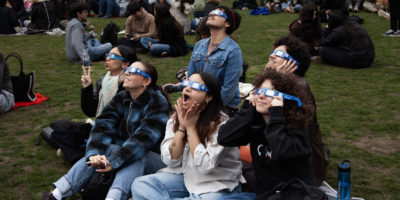By Fatima Najm
Noushin Farnoud can still see the pieces of brain splattered across the window of a building in the just-bombed wreckage of her Tehran neighbourhood. She rubs her temples delicately as she recounts the smell, the smoke and the raw fear of being in an Iranian war zone. The 23-year-old electrical engineering masters student still shudders at the memory of herself as a 10-year-old clinging to her parents’ hands, staring at buildings that had been cleaved into sections with the ease of “someone slicing a cake” by the incessant bombing Tehran endured during the Iran-Iraq war.
A hospital close to her home had been bombed and her parents had set out to examine the damage. Along the way were homes of friends and Farnoud says, “I will never forget the way I could see all the levels of the building and into the living room, the building looked like a cake had been sliced.”
Her parents saw blood and realised someone had been caught in the blast. They tried to shield their daughter from the sight of human carnage, but not before she saw the brain — a mushy mass of discoloured red, it looked nothing like the illustrations she would later see in her science textbooks.
“That was the reality of everyday life in the middle of a war,” she shrugs. Elbows on the table, she hunches forward, her hands massaging the back of her neck before she straightens up.
“I have forgotten so much of this now. But I suppose one should not. Remembering helps us realize how fortunate we are to have survived.”
Time and place have dissolved around us and we are traversing the terrain of war-torn Tehran through 10-year-old eyes.
The television was on all the time, Farnoud says, 24 hours a day. Loud static followed by a deep male voice telling listeners that Iraqi planes would be flying overhead in moments. There was no “normal” programming as the TV was a means by which the state warned families across the nation that danger was near. A few seconds later, sirens would go off in the city, prompting civilians to seek shelter and brace for the bombing.
All Farnoud remembers is grabbing a little doll she had made herself and holding it close as her parents rushed to shut off lights and snatch up rations before retreating to the basement to wait for the blasts.
“We’d wait in the darkened room in complete silence,” Farnoud says. “And then we’d hear the explosions, and shattering glass,” and the city would be still again.
If the warning came early enough and they had time, the family and two friends would take off to a nearby village where they would seek refuge in a large, old house that belonged to the friends.
“We had a candle and a copy of the Qur’an.. But we felt fortunate we were together and safe for the moment.”
During those difficult times, Farnoud kept a diary that her father still has in Tehran. The first line the 10-year-old penned reads, “what is the meaning of a life like this when you don’t even know if you or your family will be alive tomorrow?” Her father would read her thoughts to his friends for years to come. For Farnoud, putting pen to paper was her way of dealing with the loss in that time of war.
She will never forget being treated for a minor illness at a hospital that was trying to keep up with the flood of wartime casualties. She woke one day to find the nurses speaking in hushed tones about the girl who has shown up in the bed next to Farnoud overnight. She had been brought to Tehran from oil-rich Abadan in where her entire family had been annihilated by Iraqi artillery.
“I tried to socialize with her, but she just lay still and silent. She was in shock, maybe, or trauma? I guess anyone would be,” says Farnoud.
But that, she reminds me, is the reality of war.
“It is why I would not wish war on the people of Iraq. So Saddam is a terrible leader, why must the people of Iraq suffer for that?”









Leave a Reply